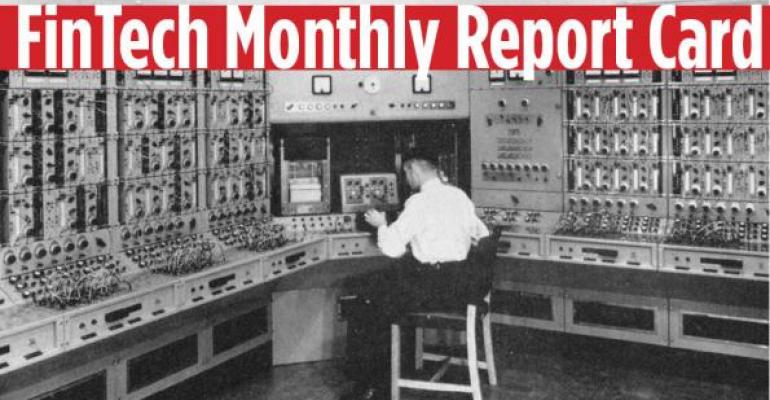Hearsay Launches Mobile Advisor Actions Mobile Solution
 What happened: Advisor digital workflow provider Hearsay Systems is offering a new event-triggered mobile solution called Advisor Actions. The solution is powered by a new API that allows advisors to receive “smart triggers,” that in turn push an action to the advisor’s CRM system, triggering an email campaign or a note for future discussions on planning around the client’s future action. “Like anyone, advisors have their mobile phones with them at all times,” said Clara Shih, Hearsay founder and CEO. “Hearsay Advisor Actions removes the guesswork and context-switching, allowing advisors to optimize how they and their staff spend time with simple click-to-call and click-to-send mobile notifications any time and on any mobile device.”
What happened: Advisor digital workflow provider Hearsay Systems is offering a new event-triggered mobile solution called Advisor Actions. The solution is powered by a new API that allows advisors to receive “smart triggers,” that in turn push an action to the advisor’s CRM system, triggering an email campaign or a note for future discussions on planning around the client’s future action. “Like anyone, advisors have their mobile phones with them at all times,” said Clara Shih, Hearsay founder and CEO. “Hearsay Advisor Actions removes the guesswork and context-switching, allowing advisors to optimize how they and their staff spend time with simple click-to-call and click-to-send mobile notifications any time and on any mobile device.”
Why it matters: After a prospect visits an advisor’s website, it could activate one of these smart triggers and an advisor could then send an automatic, compliance-approved message to set up a call or meeting, right from their phone. How cool is that? I believe the advisor of the future isn’t tied to their desk, and Hearsay is continuing to innovate for the mobile advisor.
Robinhood Launches Its Own Clearing System
 What happened: Robinhood announced it has finished building its own clearing system, Clearing by Robinhood, and will be switching its customers over from Apex Clearing to Robinhood Securities. “Since we’re no longer depending on a third party, we basically control our destiny,” said Robinhood Co-CEO Vlad Tenev. The company, valued at $5.6 billion in May, is preparing for an IPO. The conversion from Apex to Robinhood Securities is scheduled for November.
What happened: Robinhood announced it has finished building its own clearing system, Clearing by Robinhood, and will be switching its customers over from Apex Clearing to Robinhood Securities. “Since we’re no longer depending on a third party, we basically control our destiny,” said Robinhood Co-CEO Vlad Tenev. The company, valued at $5.6 billion in May, is preparing for an IPO. The conversion from Apex to Robinhood Securities is scheduled for November.
Why it matters: Apex already has really good tech, so it’s surprising to see Robinhood make this kind of move. Given their history of making money in some controversial ways, are they doing this to actually control their destiny or is controlling the clearing another way to monetize customers?
SEC Launches FinHub
 What happened: The Securities and Exchange Commission launched their FinHub portal, a site that serves as the agency’s “strategic hub for innovation and technology.” It’s accessible to the public and also will serve as an exchange of ideas for those in the industry and other regulators. The hub covers four topical areas: (1) blockchain/distributed ledger, (2) digital marketplace financing, (3) automated investment advice, and (4) artificial intelligence/machine learning. Under each topic, there are links to current regulations, investor information and various speeches and presentations.
What happened: The Securities and Exchange Commission launched their FinHub portal, a site that serves as the agency’s “strategic hub for innovation and technology.” It’s accessible to the public and also will serve as an exchange of ideas for those in the industry and other regulators. The hub covers four topical areas: (1) blockchain/distributed ledger, (2) digital marketplace financing, (3) automated investment advice, and (4) artificial intelligence/machine learning. Under each topic, there are links to current regulations, investor information and various speeches and presentations.
Why it matters: There’s not actually much to this—it’s basically a page with links to 25 SEC documents relevant to AI, Automated Advice, Blockchain and Crowdfunding. While this isn’t exactly groundbreaking, accessible resources are going to be especially useful in such a highly regulated space. It’s a step in the right direction.
Fidelity Plans Open Architecture Digital Store
 What happened: Fidelity is launching its open architecture digital store, Wealthscape Integration Xchange, to reaffirm its commitment to working and integrating with outside tools. “By putting the building blocks all in one place, we’re simplifying the user experience and helping clients efficiently create the right technology offerings for their businesses,” said Tricia Haskins, vice president for Fidelity Institutional’s digital strategy and platform consulting division.
What happened: Fidelity is launching its open architecture digital store, Wealthscape Integration Xchange, to reaffirm its commitment to working and integrating with outside tools. “By putting the building blocks all in one place, we’re simplifying the user experience and helping clients efficiently create the right technology offerings for their businesses,” said Tricia Haskins, vice president for Fidelity Institutional’s digital strategy and platform consulting division.
Why it matters: Fidelity has come a long way in terms of integration, so this move is largely about them organizing compatible tools in one spot. The major custodians have all been in a race to integrate for some time; TD Ameritrade got the ball rolling more than eight years ago and Charles Schwab just set a goal to double integrations by the end of 2019. Thumbs up to Fidelity for doubling down on these efforts.
HSBC Enters Digital Advice Space
 What happened: HSBC Bank USA and Marstone Inc. announced a partnership to develop HSBC Wealth Track, a software-based investment advice platform. Wealth Track will allow clients to quickly create a diversified low-cost portfolio for both retirement and non-retirement accounts. The partnership will begin its pilot this month but is already fully integrated with Pershing LLC, HSBC’s custodian.
What happened: HSBC Bank USA and Marstone Inc. announced a partnership to develop HSBC Wealth Track, a software-based investment advice platform. Wealth Track will allow clients to quickly create a diversified low-cost portfolio for both retirement and non-retirement accounts. The partnership will begin its pilot this month but is already fully integrated with Pershing LLC, HSBC’s custodian.
Why it matters: A big bank enlists the services of a white-label tech provider to build a self-directed investing solution. That sounds familiar, doesn’t it? We’re still in the early stages, and these products almost always take longer to launch and cost more to build than expected. After that is when the uphill battle of client acquisition really begins. Then again, maybe this takes off, democratizes investing, and provides a path to real advice. I’ll happily flip that thumb right-side-up if it happens.
Redtail Announces Redtail AI at the Fearless Investing Summit
 What happened: Announced at Riskalyze’s Fearless Investing Summit in San Antonio, Redtail CRM’s new artificial intelligence technology will provide advisors with three specific, actionable feedback buckets: sentiment, keyphrases and entities, or tags, such as specific types of investment accounts. The new feature will not auto-draft emails or automatically execute actions. Instead, it’s looking for patterns in discussions or client needs, as well as getting advisors more comfortable with machine learning in their practices.
What happened: Announced at Riskalyze’s Fearless Investing Summit in San Antonio, Redtail CRM’s new artificial intelligence technology will provide advisors with three specific, actionable feedback buckets: sentiment, keyphrases and entities, or tags, such as specific types of investment accounts. The new feature will not auto-draft emails or automatically execute actions. Instead, it’s looking for patterns in discussions or client needs, as well as getting advisors more comfortable with machine learning in their practices.
Why it matters: Up to now, the only real deployment of AI in the wealth management space has been in press releases, so it’s exciting to see Redtail take a leadership stance here. If any platform can help advisors become more comfortable using AI in their practice, it’s Redtail.
Asset-Map Integrates With MoneyGuide Pro
 What happened: Asset-Map announced the completion of its integration with PIEtech. Through this partnership, financial advisors can access MoneyGuidePro household data through Asset-Map’s visualization platform to create comprehensive, one-page visual summaries of a client’s financial life. “Connecting planning progression with visual clarity is an obvious advantage for the advice-driven financial community and we’re excited to see the impact of our collective vision,” said Adam Holt, founder and CEO of Asset-Map.
What happened: Asset-Map announced the completion of its integration with PIEtech. Through this partnership, financial advisors can access MoneyGuidePro household data through Asset-Map’s visualization platform to create comprehensive, one-page visual summaries of a client’s financial life. “Connecting planning progression with visual clarity is an obvious advantage for the advice-driven financial community and we’re excited to see the impact of our collective vision,” said Adam Holt, founder and CEO of Asset-Map.
Why it matters: The combination of MoneyGuidePro’s depth and Asset-Map’s single-page simplicity is going to be a great asset for advisors that use these platforms. Both tools have integrated with the Riskalyze Risk Number, and we can’t wait to see how advisors use all of them together.
LPL Revamps New Advisor Training as Well as Succession Planning
 What happened: LPL Financial launched a new training program aimed at easing the transition of advisors new to the industry while helping to ensure succession planning for the firm’s current advisors. LPL’s new Independent Advisor Institute will pair rookie advisors with current LPL advisors to help with onboarding and developing new recruits through a structured training program.
What happened: LPL Financial launched a new training program aimed at easing the transition of advisors new to the industry while helping to ensure succession planning for the firm’s current advisors. LPL’s new Independent Advisor Institute will pair rookie advisors with current LPL advisors to help with onboarding and developing new recruits through a structured training program.
Why it matters: LPL is clearly aware of the opportunities in front of them—they’ve made great strides in data feeds and integrations, and now this. Succession and recruitment plans are going to be essential if half of today’s advisors plan to retire by 2032 (according to Cerulli Associates). LPL might just pave the way for other firms tackling this problem, and that’s great to see.





